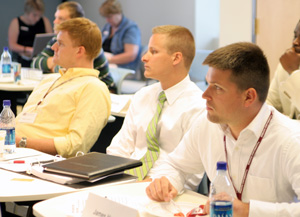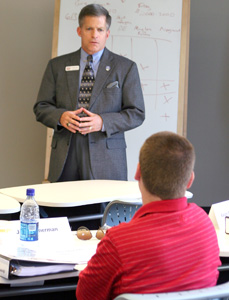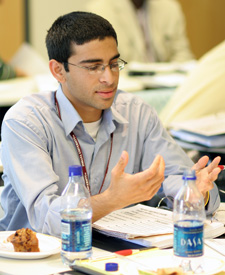Indianapolis, Ind. - Wabash men have long been known for their entrepreneurial ideas. But current students and alums came together July 6 and 7 in Indianapolis for a workshop aimed at helping both groups sharpen their ideas for business success.
 Wabash College sponsored a two-day Entrepreneurship Accelerator program by Indiana University’s Johnson Center for Entrepreneurship and Innovation. Dr. Donald Kuratko led the students and alums through discussion and exercises evaluating business plans and ideas.
Wabash College sponsored a two-day Entrepreneurship Accelerator program by Indiana University’s Johnson Center for Entrepreneurship and Innovation. Dr. Donald Kuratko led the students and alums through discussion and exercises evaluating business plans and ideas.
"We’re taking ideas, in concept, or established ideas and we’re trying to accelerate those," Kuratko explained. "We give them the concepts to understand feasibility studies and business plans. What are the areas they need to go back and really re-examine? We’re trying to make sure they have the tools they need to position themselves for success."
The highly-regarded director of the Johnson Center program said there are a several key ingredients to entrepreneurial success.
"We focus heavily on market research because we see a lot of entrepreneurs who just assume the world will buy their products or service and we do a lot of work with them on why the market research is so important," Kuratko said.
 "So many (entrepreneurs) do not articulate the concept carefully enough and understand within the competitive world out there where does it fit and how it is truly unique or better and what’s the real value they bring. Marketing and concept refinement are critical areas that entrepreneurs have got to think about and work on very hard."
"So many (entrepreneurs) do not articulate the concept carefully enough and understand within the competitive world out there where does it fit and how it is truly unique or better and what’s the real value they bring. Marketing and concept refinement are critical areas that entrepreneurs have got to think about and work on very hard."
Several of the alums participating have entrepreneurial ideas already set in motion, while others were contemplating new businesses.
"This is a top-not incubator for burgeoning life science companies," said Hugh Vandivier ’91. "You really feel like the biggest thing stopping a truly innovative and feasible idea is the insecurity of the person who came up with it. Workshops like these best serve to test ideas and hopefully dispel much of that insecurity.
"What better way to think critically about a business idea than to run it by a group of Wabash alums. After all, we’re taught to solve problems, right?"
Part of Kuratko’s two-day session is to emphasize business details and keep projections realistic.
"Entrepreneurs have all kinds of things they tend to skip over," he said. "Many just assume the market is there. "They worry about these tremendous financial numbers and they beef up their numbers to show unbelievable revenue they’re going to make in the next two or three years. The problem is they have no marketing base for that. They have these puffed up numbers they think is going to impress everybody and most of us in the financial world are used to seeing puffed up numbers. If they are over selling the numbers they think they’re going to get interest and they’re almost killing the idea."
 Tahir Ahmed ’09 called the workshop a great learning experience. "It showed me what is required to start a business and also how to write a business plan," he said. "Meeting the alumni was also a great part of the workshop."
Tahir Ahmed ’09 called the workshop a great learning experience. "It showed me what is required to start a business and also how to write a business plan," he said. "Meeting the alumni was also a great part of the workshop."
The enthusiasm of the students and alums can be focused to entrepreneurial success.
"Entrepreneurs cannot remove themselves from the passion and energy that are needed to drive the business," Kuratko warned. "We tell everyone in these workshops if you have an idea or a concept and you’re moving toward the business stage you have to be energetic enough and passionate enough about this idea to take it all way to where it needs to be for a harvest, an acquisition or whatever. "If you don’t the passion it just can’t be some part-time thing or something you’re doing on the side to make a lot of money. That’s just not going to fly."
In photos: Top right, Hugh Vandivier '91, Kelly Pfledderer '96, and James Hamstra '00 listen to a classroom presentation. Center, Kuratko engages student Jay Leatherman '07 in discussion. Bottom, Tahir Ahmed makes a point in group discussion. On homepage, Andrew Newkirk '08, Keith Veal '92, and Shawn Tabor '96 work in their group on a problem.